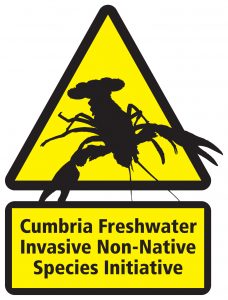What was the CFINNS Initiative
The Cumbria Freshwater Invasive Non-Native Species (CFINNS) Initiative was a collaborative project funded by the Environment Agency, Natural England and DEFRA. It was initially an 18 month project that started in 2010 but continued to run until 2020. Rebecca Corrie-Close was the Initiative Coordinator who was based at South Cumbria Rivers Trust.
The initiative was a pilot for a county-wide, multi-catchment project for freshwater and riparian invasive non-native species (INNS). The Initiative wanted to achieve a sustainable county-wide management framework that prevented the introduction of, or detect, control and/or eradicate specified INNS throughout Cumbria. The CFINNS Initiative aimed to promote awareness and management of freshwater INNS issues from promoting biosecurity to training volunteers and co-ordinating removal of certain species.
Background..a bit about INNS
Over 10,000 years ago following the Ice Age, plants and animals slowly colonised Britain coming from mainland Europe northwards. As sea levels rose, Britain was cut off from the European mainland and became an island. It is the species that had colonised Britain and established themselves during this period that we call native species.
Since then, we humans have introduced many new species of animals and plants to Britain and these are called non-native species. A minority do have serious negative impacts. These species spread causing damage to the environment, economy and health and are called invasive non-native species.
Natural barriers to the movement of species such as oceans and mountains have meant that unique ecosystems have developed throughout the world. Globalisation has expanded the possibilities, extent and complexity of world trade which along with the growth of tourism has expanded hugely the movements of people, commodities and products. New waterways are being built and link to river catchments across Europe and there is an increase in water-based recreation too. This has increased unintentional and intentional introductions of species outside their natural range, and establishment of FINNS away from their co-evolved competitors and predators.
Cumbria’s unique freshwater environment is increasingly under threat from INNS. When they become established out of their native locations some species can cause severe and sometimes irreversible damage to the environment.
Biosecurity
Freshwater INNS are able to ‘hitchhike’ on our equipment, footwear, clothing and boats. When we move to a new river, tarn or lake, a species may be transferred and may become established, often having devastating effects.
We can all help to prevent the spread of freshwater hitchhikers by following a simple three step process every time we leave any pond, stream or lake…. CHECK, CLEAN and DRY.
A range of documents and resources have been produced through the initiative which are available to download free of charge. If you would like to use any of these resources, please credit ‘The CFINNS Initiative’. Thank you.
Resources


